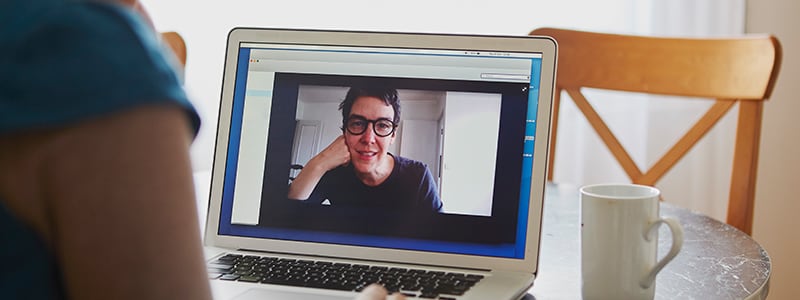Here’s the reason why everyone covers up their webcam
Webcams are commonplace now; they’re on your laptop, your tablet and your smartphones. While it’s great to be able to chat with friends or family and see their faces, webcams also pose a danger to your internet security.

Webcams are commonplace now; they’re on your laptop, your tablet and your smartphones. While it’s great to be able to chat with friends or family and see their faces, webcams also pose a danger to your internet security.
A skilled cybercriminal can find a way to take advantage of that webcam and use it to record the sights and sounds of everything it can. You might think that you’d recognise if someone’s doing that to your device, but the truth of the matter is that there are known ways to make sure the LED light that normally turns on will stay off, even when it’s running.
The reason why everyone covers up their webcam is because you never know who could be on the other end watching. If they are, they’re mostly likely not snacking on popcorn and enjoying the show. Instead, they’re probably gathering footage to extort, blackmail or generally just cause a bit of mayhem.
Luckily, it’s an easy cyberthreat to protect against if you know what you’re doing. Let’s take a look at why you should cover up your webcam, what might happen if you don’t and seven tips you can use to improve your webcam internet security.
Why you should cover up your webcam
Cybercriminals are constantly trying to find ways to target and steal information Usually this takes the form of hijacking online bank accounts, stealing financial data used for online shopping or cracking into social media accounts.
But you may have seen a co-worker or a friend with a piece of tape over his or her webcam lately. That’s because cyberthreats are targeting webcams, mostly because it doesn’t cross the average person’s mind that they can be hacked.
The same viruses and malware that steal information can also plant a programme that will record whatever a webcam sees. For many, this is activity that takes place in the comfort of their own homes or in the privacy of work. If used for malicious purposes, a webcam could record sensitive moments or material, with the infected laptop sending them back to the cybercriminal.
The material that’s collected can be used for a range of purposes, like blackmail or to cause a victim distress. It’s a cruel cyberthreat that has a very real-life impact on whoever it affects.
What happens if you don’t cover up your webcam
Simply put, if you don’t take precautions to secure your webcam then your internet security won’t be as strong as it should.
There are two types of common webcams, each having different vulnerabilities that make it easy for cybercriminals to attack. These include:
- Wireless webcams: These cameras use wireless connectivity to connect to your laptop or computer, but that also means that they have an IP address and a password. Oftentimes, the password is left as the default option, which means that if a cybercriminal is able to find the IP address, he or she can pretty easily guess the password and take over the device.
- Built-in webcams: These cameras are built into your laptop or tablet and are handy for video conversations. But if the device gets a virus or malware, cybercriminals can easily take over the webcam functionality and turn it on or off as they wish, as well as keep the LED light off to avoid detection.
Smartphone’s front-facing webcams typically aren’t considered an internet security risk because when you’re not using it, it’s usually tucked away in your purse or pocket. But the aforementioned webcams can be easily accessed by a trained cybercriminal and because of their positions – facing your living room, kitchen or office – they can expose your information and take away your privacy.
If you don’t cover up your webcam or do anything to improve their internet security, you’re opening an easy pathway for a cyberthreat to become a real-life threat.

7 tips to improve webcam internet security
While covering your webcam is an easy trick to avoid someone spying on you, it’s a plaster that doesn’t help with the root of the problem: internet security. Plus, simply putting tape over your webcam doesn’t mean someone can’t still listen in through the speakers.
Here are seven tips you can use to improve webcam internet security:
- Get antivirus software. Built-in webcams can be hacked with common viruses and malware, while antivirus software like Norton 360 can help you better protect your device against cyberthreats.
- Make sure your firewall is running. Firewalls act as a gate ensuring only legitimate traffic makes it to your built-in webcam.
- Use Norton SafeCam. With Norton SafeCam in Norton 360, you’ll be notified of attempts to access your webcam so that you can block them. It offers protection against attempts to access your webcam and compromise your privacy.
- Change the password on your wireless webcam. Thousands of wireless webcams are out there with the same default password that was coded into them. With one change, you can vastly improve the security of these devices.
- Update your software. Cybercriminals often compromise devices and download viruses by using vulnerabilities found in the operating system or popular software like Adobe Flash. Ensure you’re constantly patching to the latest version so that you’re receiving the critical security updates your device needs to keep protection.
- Avoid strange links or attachments. Email phishing provides a perfect way for a cybercriminal to drop a webcam virus or malware to someone they’re targeting. Only open emails and links or download attachments from email addresses you trust.
- Use a sliding webcam cover. Seems simple enough – slide the cover when you want to talk face-to-face with someone and close it when you’re not using it.
If you follow these tips and use software like Norton 360 solution which includes Norton SafeCam, you’ll be on your way to living a more protected connected life.
Editorial note: Our articles provide educational information for you. Our offerings may not cover or protect against every type of crime, fraud, or threat we write about. Our goal is to increase awareness about Cyber Safety. Please review complete Terms during enrollment or setup. Remember that no one can prevent all identity theft or cybercrime, and that LifeLock does not monitor all transactions at all businesses. The Norton and LifeLock brands are part of Gen Digital Inc.




Want more?
Follow us for all the latest news, tips, and updates.